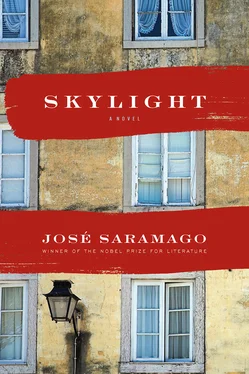From the stairs came the sound of someone sweeping. Then she heard Dona Carmen begin a mournful song, accompanied, in the background, by the continuing clatter of the sewing machine and the sole of a shoe being hammered into place.
Taking another delicate bite of a biscuit, Lídia resumed her reading.
In the living room, the weary old clock — inherited by Justina after the death of her parents — gave a long, asthmatic wheeze followed by nine nasal chimes. The apartment was so quiet it seemed uninhabited. Justina wore felt-soled shoes and moved from room to room as subtly as a ghost. She and the apartment were so perfectly matched that, seeing them together, one could understand at once why they were as they were. Justina could exist only in that apartment, and the bare, silent apartment could not be as it was without Justina’s presence. A smell of mold emanated from both furniture and floor, and a musty aroma hung in the air. The permanently closed windows contributed to the tomb-like atmosphere, and Justina was so slow and lackadaisical that the house was never entirely clean.
The vibrations from the chimes — which had temporarily driven out the silence — slowly died away, ever more tenuous and distant. Justina turned out all the lights, then went and sat by the window that gave onto the street. She liked sitting there, motionless, vacant, her hands lying limp in her lap, her eyes open to the darkness, waiting for what? Even she did not know. The cat, her sole companion in the evenings, came and curled up at her feet. He was a quiet creature with questioning eyes and a sinuous gait, and appeared to have lost the ability to meow. He had learned silence from his mistress and, like her, surrendered himself to it.
Time slipped slowly by. The tick-tock of the clock kept nudging the silence, trying to shoo it away, but the silence resisted with its dense, heavy mass, in which all sounds drowned. Both fought unremittingly on, the ticking clock with the obstinacy of despair and the certain knowledge of death, while the silence had on its side disdainful eternity.
Then another, louder noise interposed itself: people going down the stairs. Had it been daylight, Justina would immediately have rushed to see who it was, more out of habit or because she had nothing better to do than out of any real curiosity, but the night drained her of energy, leaving her tired and listless and filled with a foolish desire to weep and to die. However, she would unhesitatingly have said that it was Rosália, along with her husband and daughter, going off to see a film. She recognized the laugh: it belonged to Maria Cláudia, who was mad about the cinema.
The cinema… How long had it been since Justina went to the cinema? Yes, there had been the death of her daughter, but even before that, it had been a long time. Matilde used to go with her father, but she always stayed at home. Why? She had no idea, she just didn’t go. She disliked walking down the street with her husband. She was very tall and thin, while he was short and stocky. On their wedding day, boys in the street had laughed when they saw them leave the church. She had never forgotten that laughter, just as she could never forget the photograph: the best man and maid of honor and the other guests lined up on the steps of the church like spectators in the stands at a soccer match; and she standing there stiffly, her bouquet drooping, her dark eyes dull and perplexed; and he, already fat, squeezed into a tailcoat and wearing a borrowed top hat. She had buried that ridiculous photograph in a drawer and never wanted to see it again.
The dialogue between the clock and the silence was again interrupted. From outside came the rumble of tires over the uneven surface of the street. The car stopped. There was a confusion of noises in the night: the creak of a hand brake being put on, the characteristic noise of a car door opening, the dull thud as it closed, a tinkling of keys. Justina did not need to get up to know who had arrived. Dona Lídia had a visitor, her usual visitor, the man who came to see her three times a week. He would leave at around two in the morning. He never spent the entire night there. He was methodical, punctual, correct. Justina did not like her neighbor. She hated her because she was pretty and, above all, because she was a kept woman and, more to the point, had a nicely furnished apartment, as well as enough money to pay for a cleaning lady, have meals from a restaurant sent up to her, and appear in public laden with jewelry and reeking of perfume. She was, however, grateful to Lídia because she had given her the excuse she needed to break off relations with her husband forever. Thanks to Lídia, she had added to her thousand other reasons the biggest reason of all.
Slowly, painfully, as if her body were refusing to move, she got up and turned on the light. The dining room, where she was sitting, was quite large, and the bulb that lit it was so feeble that it could only just manage to keep the darkness at bay, leaving shadows lurking in the corners. The bare walls, the hard, unwelcoming stiff-backed chairs, the table unpolished and unadorned by flowers, the stark, drab furniture — and alone in the midst of all that coldness sat tall, thin Justina, in her black dress and with her deep, dark, silent eyes.
The clock whirred twice and very timidly struck the quarter hour. A quarter past nine. Justina yawned slowly. Then she turned out the light and went into her bedroom. On the chest of drawers the photo of her daughter smiled cheerily out at her, the only brightness in that somber, musty room. With a sigh of resignation, Justina lay down.
She always slept badly. She spent the night jumping from dream to dream, confused dreams from which she awoke exhausted and perplexed. Try as she might, she could never reconstruct them. The only thing she could remember — and even then it was more like a presentiment or perhaps the memory of a presentiment — was the obsessive presence of someone behind a door that all the strength in the world could not open. Before falling asleep, she would try over and over to recall Matilde’s face, her voice, her gestures, her laughter, yes, even her dead face, as if in her dreams she might succeed in breaking down that eternally locked door. All in vain. When Justina closed her eyes, Matilde would hide away so effectively that Justina would only find her again, beyond the mystery of dreams, when she woke the following morning. But finding her in that way meant losing her again; seeing her as if she were still alive meant not seeing her at all.
Her eyelids drooped beneath the weight of shadows and silence. The silence and the shadows entered Justina’s mind. The slow saraband of dreams was about to begin, the strange, distressing presence was about to reappear, along with the locked door behind which lay the mystery. Suddenly, far off, dull, desperate moans could be heard. The night shuddered at these supernatural noises. Justina’s already clouded eyes opened onto the darkness. Rolling down mountains and across plains, awakening echoes in shadowy caves and in the hollows of ancient trees, hurling out into the night a thousand tragic sounds, those moans came nearer and the moaning became weeping and each lament a tear as big as a fist that fell as hard as a fist.
Justina’s eyes battled against the anxiety provoked by the noises filling her ears. She felt as if she were being dragged down into a deep, dark abyss and was struggling not to fall in. As she fell, though, Matilde’s bright smile appeared to her and, clinging desperately to that smile, she plunged into sleep.
Penetrating the walls and rising to the stars, the music continued, the slow movement of the Eroica Symphony, crying out against pain, crying out against the injustice of man’s mortality.
Читать дальше












